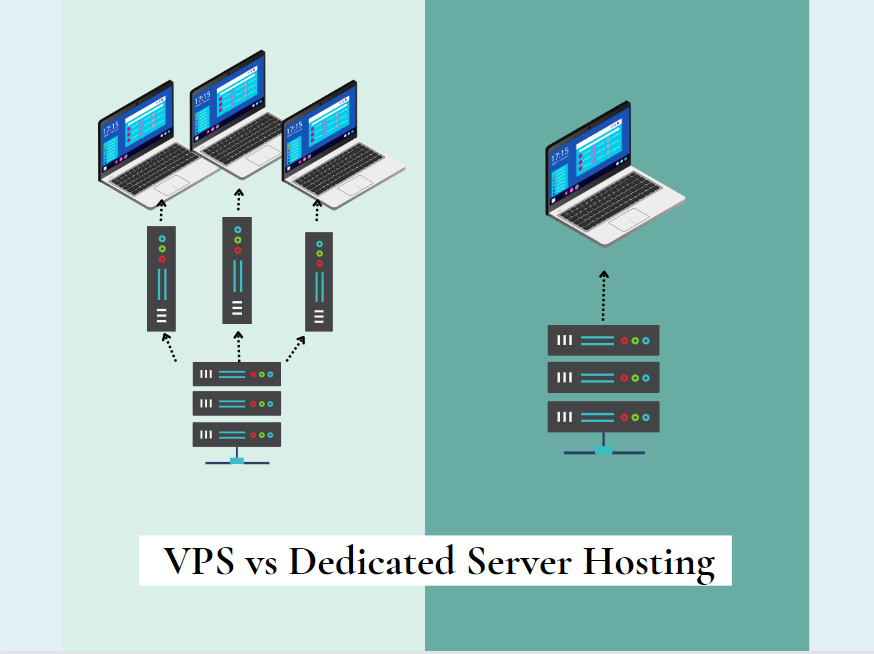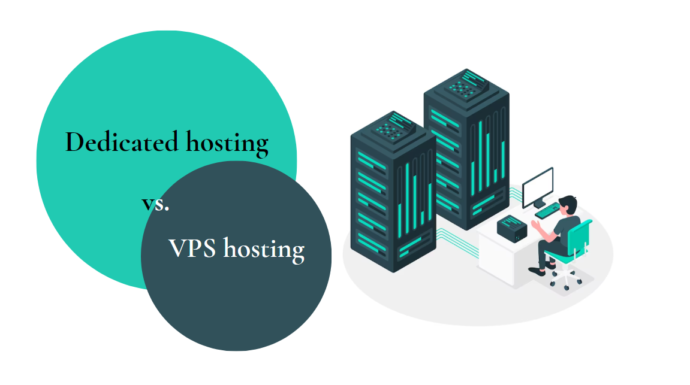- What is VPS vs Dedicated server?
- Terminology explained
- Pros & Cons of dedicated serves and VPS web hosting
- Which one should you use and why?
- Best hosting companies for VPS and dedicated web hosting
- IP address differences
- Conclusion
Trying to understand the difference between VPS vs dedicated server?
Both dedicated servers and VPS provide separate resources for your website, unlike shared hosting.
However, they achieve this in different ways and have significant differences in cost.
To make the best choice for your requirements and budget, let’s compare VPS hosting vs dedicated hosting in this post.
What is VPS hosting?
When it comes to a VPS hosting (virtual private server), you share the server’s resources with other users, but your site still receives dedicated resources within its portion of the server.
Let’s say the server has 8 GB of RAM. In a VPS scenario, your site might be allocated 1 GB of that RAM.
The crucial point is that this 1 GB is exclusively for your site and not shared with anyone else.
To manage these resources, a VPS hosting provider employs a hypervisor, to create virtual machines for each customer on the server.
The technical details aren’t essential to grasp. What matters is that each VPS account remains completely isolated from other accounts.
To help visualize this, let’s use a housing analogy. Think of a VPS as a condominium building.
If you own a condo in that building, it’s entirely yours. Your neighbors can’t simply barge into your living room because they’re hosting a big party (that’s how shared hosting works!).
However, you don’t own the entire building—you’re just one of the many condos. Consequently, you can’t decorate the entire building.
In server terms, this means you can’t customize the hardware according to your specific needs because you’re just one tenant among others on the entire server.
What is dedicated hosting?
As the name implies, a dedicated server means you have your “own” server exclusively for your website(s). Unlike a VPS where you only get a portion of the server, with a dedicated server, you get the whole thing.
The significant advantage of dedicated servers, besides potentially having more resources, is that you have complete control over both the physical hardware and the software running on the server.
For instance, let’s say you have a preference for AMD processors over Intel processors.
With dedicated hosting plans, you have the freedom to make that choice. You also have control over every piece of software installed on the server’s hardware.
Now, let’s return to the housing analogy.
In this scenario, a dedicated server is comparable to owning your own house. You are the sole owner of the building—it’s 100% yours.
Moreover, you have full authority to customize the entire building according to your preferences.

Important terms explained
In addition to understanding the difference between VPS and dedicated servers, there are two other important terms to grasp when it comes to VPS and dedicated hosting.
VPS and Dedicated servers: managed or unmanaged
Unmanaged

With an unmanaged VPS or dedicated server, you receive the basic hardware, but you are responsible for setting up and maintaining the server yourself.
This involves not only installing applications like WordPress but also configuring underlying technologies.
Managed

In contrast, a managed VPS or dedicated server entails the hosting provider handling the server configuration itself, management, and maintenance of the server for you in their hosting plan.
While managed servers are more expensive, they are beneficial for non-technical users who prefer to offload the technical aspects to the provider.
Regular VPS hosting vs cloud VPS hosting
Nowadays, the term “cloud hosting” or “cloud VPS hosting” can cause confusion.
Cloud hosting follows the same basic principle as traditional VPS, but with a key difference:
- Traditional VPS: Your site’s dedicated resources come from the same server.
- Cloud VPS: Your site’s dedicated resources are sourced from multiple servers, known as the “cloud.”
Many providers have transitioned their hosting plan to the cloud VPS approach due to its increased flexibility.
However, for the purpose of understanding, it’s acceptable to consider VPS and cloud VPS as essentially the same thing.
Virtual Private Server and dedicated hosting: Pros & Cons
| Pros&Cons | VPS Hosting | Dedicated Hosting |
|---|---|---|
| Pros: | 1. Cost-effective compared to dedicated hosting. | 1. Offers maximum performance and reliability. |
| 2. Provides dedicated resources for your site. | 2. Full control over server hardware and software. | |
| 3. Scalable – resources can be adjusted as needed. | 3. Ideal for resource-intensive applications. | |
| 4. Offers flexibility in terms of customization. | ||
| 5. Can be managed or unmanaged, depending on needs. | ||
| Cons: | 1. Resources are shared, so performance may vary. | 1. More expensive than VPS hosting. |
| 2. Limited control over server hardware and software. | 2. Requires technical expertise for setup and maintenance. | |
| 3. May experience limitations on server customization. | 3. Not cost-effective for small-scale projects | |
| 4. Relies on the hosting provider’s support and services. | 4. Fixed resources that may not be fully utilized. |
Why should you use VPS vs Dedicated server
For most people, a VPS is a better choice compared to a dedicated server, especially if you opt for a cloud VPS provider.
Cloud VPS solutions offer similar advantages to a dedicated server, but at a more affordable price and with greater flexibility.
That’s why, in 2023 and beyond, many businesses are shifting towards cloud hosting instead of maintaining their own shared and dedicated hosting solutions.
In reality, a dedicated server is only necessary for websites with high web traffic and specific hosting requirements.
For the majority of other websites, opting for a cloud VPS is a superior option.
Resource management

To understand resource allocation, let’s use a pizza analogy.
In VPS hosting, it’s like ordering a pizza to share with others. Everyone gets a portion of the pizza, including the slices, sides, drinks, and dips.
If you need extra resources, there’s a chance someone might share them with you, but it’s not guaranteed.
On the other hand, with dedicated hosting, you have your own pizza.
It could be a small, medium, or large pizza, depending on your needs, but it’s exclusively for you. Naturally, you’ll pay more, but in return, you have full control over all the toppings and sauce.
Since you have a larger portion of the server’s physical hardware in dedicated hosting, you have more resources available to you.
Additionally, you’ll have root access to the operating system, which means you can install additional software and make changes to any file on the server.
Security

Let’s compare security to living in a block of flats versus having your own house.
If someone in the building leaves the main door open (meaning another site on the server experiences a security breach), there is a potential risk for everyone in the building, including you.
While they still need to breach the security of your specific flat, there is still a security risk present
Although VPS hosting is generally considered secure, dedicated hosting provides an elevated level of protection.
Both hosting types allow you to install your own security software, but with dedicated hosting, you have complete control over handling any security breaches that may occur.
For example, shared hosting involves sharing server resources with multiple websites, resulting in lower costs but limited performance and control.
Performance

In the web hosting space, performance refers to how quickly your website loads and operates for users, and how smoothly it functions.
To illustrate performance, let’s use a bus route analogy.
Imagine your website as a bus route. When only a few people board the bus, the driver stops less frequently, resulting in a faster journey (quick loading speeds).
However, if many people board the bus (visit your site), the driver has to stop at every destination, inevitably slowing down the journey (slower website).
With VPS hosting, you have your own bus. And if your bus becomes full, there’s a possibility of adding a second bus (utilizing bandwidth from another site) to serve your passengers.
On the other hand, dedicated hosting provides a turbo-charged, double-decker bus that can transport a large number of visitors to your site at a lightning-fast speed.
Unlike shared hosting for example, where you share server resources with multiple websites therefore limiting your performance. both VPS plans and dedicated hosting plans compare better in performance than a shared hosting server.
Customization and configuration

Both VPS and dedicated hosting provide options for managed and unmanaged plans. You can think of these plans as assembling furniture.
With an unmanaged hosting plan, you are given the necessary tools to build it yourself. On the other hand, with a managed plan, the furniture is already built and maintained for you.
It’s not surprising that most people prefer managed plans, despite them being slightly more expensive.
When it comes to customization, both VPS and dedicated hosting allow you to adjust your resource limits on a monthly basis, so there isn’t much difference in that aspect between the two.
Scalability

Scalability refers to how well your web hosting plan can accommodate the growth of your website. Let’s imagine it as the growth of a tree.
In the case of VPS hosting, it’s comparable to a budding olive tree.
There is room for growth, but it may not reach the same heights as a magnificent oak tree. VPS hosting offers the potential to expand, but there may be limitations on the extent of scalability.
On the other hand, dedicated hosting is like a majestic oak tree. It provides you with abundant resources, security, and performance, leaving little room for further scaling.
While you can adjust your limits on a monthly basis, you essentially encounter a glass ceiling where scalability becomes constrained.
Price

No analogy is needed to understand pricing because, as we know, money plays a significant role.
As expected, dedicated hosting is pricier compared to VPS hosting.
It provides the highest level of hosting quality available, so it’s understandable that these plans come with a higher price tag.
VPS hosting company, on the other hand, offers a range of prices.
There are different tiers of plans available, each offering varying levels of resource limits. This allows you to choose a plan that suits your specific needs and budget.
Best hosting providers
VPS hosting providers
If you choose VPS hosting, here is a list of the best hosts to consider when you are getting started:
Managed VPS hosting:
| Hosting Provider | Starting Price for VPS Hosting | Rating |
|---|---|---|
| Cloudways | $10/month | 4.8 based on 5,000+ reviews |
| InMotion Hosting | $17.99/month | 4.4  based on 1,200+ reviews |
| A2 Hosting | $19.99/month | 4.6  based on 1,500+ reviews |
| Bluehost | $29.99/month | 4.5  based on 1,000+ reviews |
| SiteGround | $80/month | 4.7 based on 2,000+ reviews |
Unmanaged VPS hosting:
Dedicated server hosts
If you think dedicated servers are the better choice for you, here are some of the hosts to choose from:
| Hosting Provider | Starting Price for Dedicated Hosting | Rating |
|---|---|---|
| Hetzner | $34/month | 4.3 based on 500+ reviews |
| Bluehost | $89.98/month | 4.5 based on 1,000+ reviews |
| A2 Hosting | $100/month | 4.6 based on 1,500+ reviews |
| Liquid Web | $169/month | 4.7 based on 2,000+ reviews |
Differences in IP addresses

IP address with Virtual Private Server hosting
In VPS hosting, you are typically assigned a virtual IP address.
Multiple virtual servers share the same physical IP address, but each virtual server has its own unique virtual IP address.
VPS hosting allows for more flexibility as resources are shared among multiple users.
Sharing IP addresses helps reduce costs as resources are allocated efficiently.
IP address with a dedicated server
With dedicated servers, you are provided with a dedicated IP address.
What is more a dedicated server gives you exclusive use of the entire server, including its resources and IP address.
Having a dedicated IP address grants you full control over its configuration and customization.
Also, a dedicated IP address can be beneficial for specific scenarios such as SSL certificates, email deliverability, and specialized applications that require a specific IP.
These IPs can contribute to better performance and reliability for certain applications.
VPS vs Dedicated server – Verdict
When you first start a website, shared hosting is usually the go-to choice because it’s the most affordable way to create a WordPress site.
However, as your site grows, you’ll need more resources and want to avoid sharing them with other sites.
To address these needs, you have two options: VPS hosting and dedicated server hosting.
With VPS hosting, the hosting provider divides a server’s resources into different parts, and you get one of those parts exclusively for your site.
These resources can come from a single machine (known as a “traditional” VPS) or from a network of multiple machines (referred to as a cloud VPS).
On the other hand, with dedicated server hosting, you get the entire physical server dedicated solely to your site.
For most people, a VPS hosting solution is a better choice, unless you’re running a high-traffic website with unique requirements.
To get started, you can explore our selection of the best affordable web hosting providers.
Frequently Asked Questions
The superiority of VPS hosting or a dedicated server depends on individual needs.
Factors to consider include resource allocation, scalability, cost, control, customization, and technical expertise.
Assess your requirements to determine the best fit for your situation.
In general, a dedicated server provides faster performance than a VPS due to its exclusive access to resources.
VPS (Virtual Private Server) provides dedicated resources within a shared server environment. Dedicated server offers exclusive access to an entire physical server.
Shared hosting involves sharing resources with multiple websites on a single server.
You may consider upgrading to dedicated hosting from VPS hosting if your website requires more resources, experiences high web traffic, demands increased control and customization and has specific security or compliance needs.
Evaluate your website’s growth, performance, and unique requirements to determine if a dedicated server is the right choice for you.



